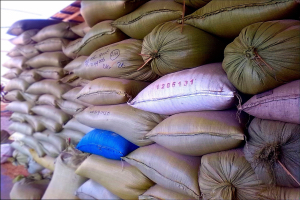
A rise in global demand impacts the domestic price of broken rice
New Delhi: Domestic price of broken rice, which was ~Rs. 16/Kg in the open market increased to about Rs. 22/Kg in States because of exports due to higher international prices. The export of broken rice increased by more than 43 times in the past 4 years (~21.31 Lakh Metric Tonnes exported from April-August, 2022 compared to 0.41 LMT in the same period in 2018-19).
There has still been a rise in global demand for broken rice due to the geopolitical scenario which has impacted the price movement of commodities including those related to animal feed. The international price of Indian rice (non-basmati others HS Code 10063090) is selling around Rs. 28-29/kg which is higher than the domestic price.
The domestic prices of Rice are showing an increasing trend and it may continue to increase due to the low production forecast by about 10 MMT of Paddy and an 11% increase in export of Non-basmati compared to the corresponding period of last year. However, with the export of 212 LMT last year, it can be said that India is still surplus in rice production.
The poultry sector and animal husbandry farmers were impacted the most due to the price hikes of feed ingredients as about 60-65% of inputs cost for poultry feed comes from broken rice and any increase in prices will be reflected in poultry products like milk, eggs, and meat.
About 50-60 LMT of broken rice is produced annually in India which is mainly used as poultry feed and feed for other animals. It is also used as a feedstock by the grain-based distilleries for producing ethanol which is supplied to Oil Marketing Companies (OMCs) for blending with petrol.
In order to ensure adequate availability of broken rice for consumption by the domestic poultry industry and for other animal feedstock; and to produce ethanol for successful implementation of the EBP programme, the Government of India amended the export policy of broken rice (under HS Code 10064000) with effect from today, from “Free” to “Prohibited”.
The government offered certain relaxations during the period September 9-15, 2022 only for cases where loading of the consignment has commenced before this Notification, shipping bill is filed and vessels have already berthed or arrived and anchored in Indian ports and their rotation number has been allocated before this Notification, consignment has been handed over to the Customs before this Notification and is registered in their system.
Export duty of 20% on Rice in Husk (Paddy or Rough), Husked (Brown Rice) and Semi-milled or Wholly milled Rice whether or not polished or glazed other than par-boiled rice and basmati rice has been imposed by the Government to lowering of prices of rice.
The government stated it has not made any changes in the policy relating to par-boiled rice (HS CODE = 1006 30 10) so that farmers continue to get good remunerative prices. Further, dependent and vulnerable countries will have adequate availability of par-boiled rice as India has a significant share in the global rice export.
Similarly, no change in policy in Basmati rice (HS CODE = 1006 30 20) has been done as basmati rice is premium rice which is majorly consumed by the Indian Diaspora in different countries and its export quantity is very less compared to other rice.
– global bihari bureau





